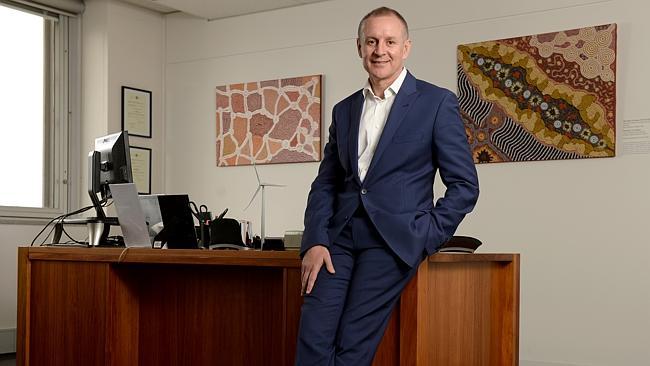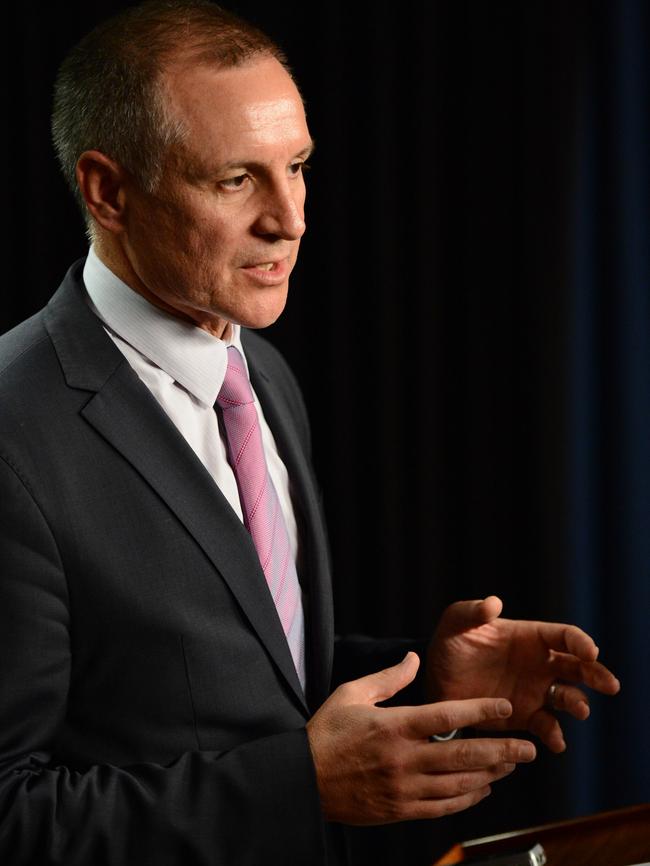Report card: How Jay Weatherill has rated in the past 12 months
A YEAR ago, Premier Jay Weatherill vowed to reinvent South Australia’s economy and society. So how’s he going? Here’s his report card in all the key areas of his self-described “bold new agenda”.

SA News
Don't miss out on the headlines from SA News. Followed categories will be added to My News.
A YEAR ago, Premier Jay Weatherill vowed to reinvent South Australia’s economy and society. So how’s he going? Here’s his year-in report card in all the key areas of his self-described “bold new agenda”.
Economy — C-
SA has the highest unemployment rate in the country — at 7.2 per cent — and the economy is flat but the State Government has enacted its promised tax reforms, which could help the situation. Treasurer Tom Koutsantonis delivered business and commercial property tax cuts in the Budget and established a $15 million investment attraction fund — modest by international standards — headed by prominent banker and Crows chairman Rob Chapman. The Government has reformed the state’s tax system to make it more attractive for businesses but homeowners are still slugged with high land tax, ESL and residential stamp duties. Jobs growth is still well below what is required to substantially reduce the unemployment rate.
Climate Change — C
The State Government has started work on making Adelaide the world’s first carbon-neutral city by signing agreements and MoUs but has yet to release detail on how it would achieve the ambitious target. SA leads the nation in renewable energy generation but the city’s public transport system is ageing and fragmented. The State Government would be required to pay a sizeable carbon credit bill or make major investments in the public transport network and reform energy efficiency regulations to achieve the goal. Time is critical as Adelaide is racing other cities, such as Vancouver in Canada, to become the world’s greenest.
Tourism — B-

The tourism sector received a $50 million boost in the June 2015 Budget, including $20 million earmarked for campaigns pitched at travellers from markets such as Asia, Europe and the US. Latest figures show SA is attracting growing numbers of interstate visitors but failing to lure more international tourists. This is despite a concerted effort by Tourism Minister Leon Bignell to travel the world spruiking the benefits of SA — at taxpayer’s expense.
A further $15 million was funnelled into the fund used to lure major events and conferences to the state. Adelaide played host to an exhibition match between Liverpool FC and Adelaide United FC, the first day-night cricket Test match (complete with controversial pink ball and stunning pink sunset) and the AFL draft.
The Government delivered on its promise to move the Adelaide Fashion Festival into the CBD.
Urban Development — B-
The most significant reforms to the state’s planning regime in a generation are before the Parliament but key components are unlikely to be passed such as removing councillors from local development assessment panels and creating an urban growth boundary around the city to stop urban sprawl. Planning Minister John Rau has streamlined the development process and provided a much-needed boost to the construction industry but critics claim he is destroying the state’s heritage.
Education — C+
The Government promised to get more education staff out of head office and into schools, give principals more powers, upgrade education buildings and encourage more school mergers to sell school land and reinvest the funds in new schools.
Child Development Minister Susan Close later revealed up to 300 staff — more than a quarter of the workers at the department’s Flinders St head office — would return to “frontline” work.
At least 15 schools have signalled interest in merging and about $50 million was put aside in the June budget to upgrade schools and build children’s centres. However, the result of much of this work is still a long way off.
Health — C
The new Royal Adelaide Hospital is still under construction and has suffered several delays and criticism about the cost of the project. Labor has delivered on its promise to restructure the state’s health system but critics claim the reforms are more aimed at cost-cutting rather than saving lives. The move to close the Repat — in 2017 — has been controversial and veterans are concerned about the level of service they will receive after the closure. As part of the reforms, major hospitals such as Flinders Medical Centre would have improved infrastructure to cope with the increased patient load. The next 12 months — and the opening of the nRAH — will determine the success of the Government’s health reforms.
Democracy — D
Legislation to change the Upper House voting rules to reduce the influence of preference deals and other measures to resolve deadlocks is before the parliament. The State Government also enacted changes last year to prevent lobbyists from serving on public boards. A state lobbyist register was also created. Premier Jay Weatherill promised to reform democracy by establishing a “week-long festival exploring the themes of collaboration, innovation and democracy”. It’s hard to judge the Premier’s success on this promise because no one has figured out what it means, despite the plan being announced six months ago.
Multiculturalism — B-
The Labor Government has increased funding for multicultural affairs from $4 million to $12 million but it has fallen short of the claim made before the opening of parliament last year that it would lead a “national discussion about how we can reach the next phase of our great multicultural project”. SA has a proud history of multiculturalism and Premier Jay Weatherill wants the state to move into interculturism — beyond tolerance and toward the celebration of cultural diversity — but it would be hard to claim the state has led a national discussion on the issue.
Nuclear — B
More than 250 submissions were provided to the Nuclear Fuel Cycle Royal Commission and it heard from 128 witnesses over 34 days of hearings. Royal Commissioner, former Governor Kevin Scarce, is due to hand down a final report in May. It is looking increasingly unlikely that South Australia will move into the manufacturing of nuclear fuel. A more likely outcome is the State Government will offer SA as a home for a future nuclear waste dump.
Driverless cars — C
Who could forget the unfortunate confrontation in November between Transport Minister Stephen Mullighan, a “driverless” Subaru and an inflatable kangaroo on the Torrens Parade Ground. Luckily, the first trial of driverless car technology in the southern hemisphere — on a closed Southern Expressway in November — went a little better. The Government has made much of the potential of such technology in SA, and has introduced the Motor Vehicles (Trials of Automotive Technologies) Amendment Bill to Parliament, but we’re yet to see what benefit — if any — it will bring to the state and when.
Time zone — F
After much fuss, this went nowhere. Public consultation dredged up long-running arguments about syncing with the eastern states, the advantages of lining up time zones with Asian trading partners and the downsides of fading curtains and kids going to school in the dark on the West Coast. In the end, time stood still.
Violence against women — A-
The pace of change is slow but the Government made good in 2015 on long-term promises including finally establishing a database of serial abusers and passing laws to close loopholes in protection orders which left victims at risk, and make it easier for women living with abusive partners to leave rental properties without facing financial penalties. Anti-violence campaigner and 2015 Australian of the Year, Rosie Batty, publicly praised a number of SA initiatives.
MPs’ pay — A+ for the pollies, F- for the public
The Premier promised to get rid of a bunch of perks for MPs, including travel allowances, and have an independent body review MPs’ pay. The result was a win for politicians and a loss for the public purse. MPs were granted a pay rise of between $30,000 and $60,000 to compensate for losing travel allowances and other entitlements to the value of just less than $30,000. Most MPs come out well in front, given they wouldn’t have made use of their full entitlements in the past.
Training reforms — C-
The shake-up of the vocational education and training sector was intended to shift subsidies for training to fields facing skills shortages, to ensure graduates found jobs. It quickly blew up in the Government’s face as private training organisations and the Opposition railed against the decision to redirect training funding away from private operators to TAFE. There were also threats from the Federal Government that it could withdraw a portion of $65 million in funding as a result of the change. Time will tell whether the new system is more effective.


